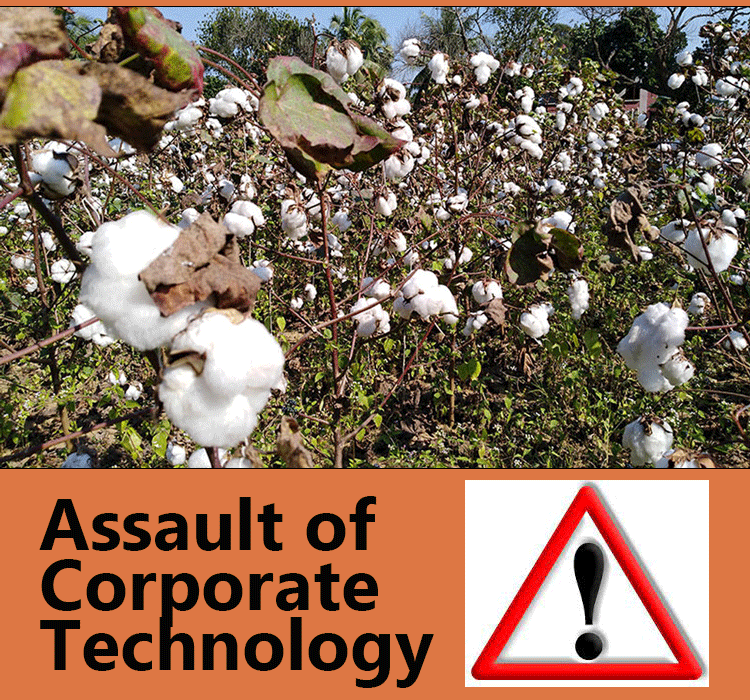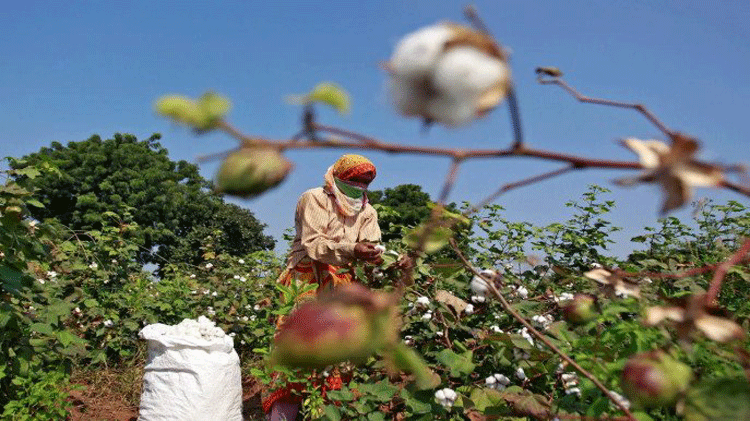Bt Cotton approval. Another alarming threat? sdf
 Farida Akhter || Monday 04 July 2022 ||
Farida Akhter || Monday 04 July 2022 ||
The introduction of GMOs is alarming news for Bangladesh, a country belonging to the biogeographical region known as the origin of diversity, and also for its climatic and agroecological characteristics, which could be detrimental to agriculture in general
The Bangladesh National Technical Committee on Crop Biotechnology (BNTCCB) of the Ministry of Agriculture at a meeting on 16 June 2022, gave the green signal to two Bt cotton varieties for final approval from the National Committee on Biosafety of the Ministry of Environment (MoE). The MoE is authorised to approve field cultivation of genetically modified crops.
The field trials of the Bt Cotton were conducted by the Cotton Development Board at the Bangladesh Agricultural Research Institute (BARI). The two varieties of Bt Cotton are sourced from the Hyderabad-based Indian company JK Agri Genetics.
The introduction of GMOs is alarming news for Bangladesh, a country belonging to the biogeographical region known as the origin of diversity, and also for its climatic and agroecological characteristics, which could be detrimental to agriculture in general.
There are also biosafety and regulatory issues that require serious public debates and deliberations. The experience of genetically modified crops is not at all rosy in countries where they have been introduced; the agronomic claims are questionable. It is also targeting industrial textile – the apparel sector; thus not concerned about its effects on agriculture.

The decision to approve Bt cotton could bring disaster to farmers and the biodiversity of Bangladesh. PHOTO: REUTERS
The National Committee on Biosafety (NCB) was established to implement the Cartagena Protocol on Biosafety of the Convention on Biological Diversity (CBD), to ensure environmentally safe management of modern biotechnological research, and field trials, and selling GMOs as commodities for profit.
The GMOs/LMO product development includes research and development, and the transboundary movement requires strong regulatory mechanisms and implementing agencies. This regulatory body is extremely important and is responsible for ensuring the biosafety of GM crops.
Unfortunately, the process of approval adopted by NCB earlier in 2013 in the case of Bt Brinjal was not transparent and was done without taking into account the national and international concerns of scientists, farmers, and civil society.
It was a political decision and the decision was taken very quickly during a violent and chaotic political situation, without going through the proper review of the documents and following regulatory mechanisms, to ensure biological safety. Bt brinjal, the genetically modified eggplant (Aubergine) was approved in October 2013, and seeds were given to farmers in January 2014.
The NCB approved Bt brinjal with seven conditions to ensure biosafety, but those were never followed up by the Ministry of Agriculture. The Ministry of Environment did not monitor the compliance of the conditions and terms of approval.
The seeds were distributed indiscriminately among the farmers. The farmers did not know that they were planting a transgenic crop that required special precautions. The brinjals were sold in the market without any labels, which violated one of the seven conditions of approval.
It can be said without any doubt that the first GM crop, the Bt Brinjal, was an imposition on the farmers, and the outcome was a failure. But the corporate-controlled reports show false "success"; there has been no research findings on health and environmental impacts since 2014.

Now, the move to approve Bt Cotton, as a second GMO crop for cultivation in Bangladesh, is a repeat of the same practice and raises many questions.
Bt cotton is a transgenic crop developed through the insertion of a bacterium gene (Bacillus thuringiensis or Bt) into cotton. It carries the Cry1Ac gene, derived from the common soil bacterium Bacillus thuringiensis var. kurstaki, which results in the expression of the Cry1Ac protein that confers resistance to the bollworm complex.
The two varieties – JKCH 1947 BT and JKCH 1950 BT - were tested in Bangladesh for their 'suitability'. The Cotton Development Board found 'no problem' with the trial and wants to get approval from the regulatory authority. It is claimed to be a pest-resistant cotton variety, which produces an insecticide to combat bollworms.
Now let's look at the experiences of other countries with Bt Cotton, particularly India, which has a cotton belt growing traditional varieties as well as hybrids. In India, cotton is considered white gold and contributes significantly to the economy, involving over 60 million people.
Cotton is cultivated over an area of about 9.5 million hectares, representing 25% of the global cotton cultivation area. Bt cotton was approved in 2002 on the grounds it would counter insect pests - Helicoverpa armigera, commonly referred to as American Bollworm, which used to cause substantial damage to the crop, resulting in low productivity.
Bt Cotton, since 2005, has rapidly spread across Indian cotton farms. But it could not show any agronomic benefits, rather, per hectare cost for seeds rose by 78%, insecticide by 158%, and fertiliser by 245%, with the overall production cost of seed cotton increasing by 143%.
We are also aware of the massive number of farmer suicides in India. According to an article published in Environmental Sciences Europe, the annual suicide rates in rainfed areas in India are inversely related to farm size and yield, and directly related to increases in Bt cotton adoption (i.e., costs).
During a recent communication with renowned environmentalist Dr Vandana Shiva on Bt Cotton, she said, "Bt Cotton has failed Indian farmers, driven them to suicide, failed to control pests, farmers are using more pesticides, many died of pesticide poisoning. Bt Cotton is only useful for industrial textiles."
She has also written that 300,000 farmers' suicides have taken place in the cotton belt, which is now predominantly a Bt cotton belt.
GMO Bt cotton was supposed to be a pest control technology that would replace pesticides. However, Bt cotton has proven to be a pest-creating technology, with epidemics of pests that never affected cotton in India before now commonplace (Bt cotton was introduced illegally in 1998, and with GEAC approval in 2002).
Cotton (Gossypium sp.) is an important cash crop in Bangladesh after jute, although it provides only 3% (nearly 0.15 bales) of the annual requirement as textile raw material. It is grown on about 42 thousand hectares of land in 34 districts in southeastern, middle, and northern zones.
In 2002, the Cotton Development Board (CDB) introduced the Chinese hybrid with the help of private seed companies.
CDB is already facing issues with higher prices of hybrid seeds, procured through private companies. As such, introduction of GM cotton, sourced from an Indian company, will create more dependence on the companies. Bangladesh imports cotton from India, Pakistan, Uzbekistan, and African countries.
The negative impact of the dependence on an Indian company for the supply of Bt cotton seeds was experienced by Kenya.
The country approved the cultivation of GMO cotton brought from Mahyco, India, in 2018, to boost production under open field cultivation. Commercialisation started in 2020. But the Indian company contracted to supply genetically modified (GM) cotton seeds to Kenyan farmers stopped distribution of the planting material, dealing a big blow to Kenya's manufacturing plans.
Mahyco, the sole maker and distributor of the seed worldwide, has had running problems with supplying the product to local farmers in Kenya. The hiccup in supply has hit cotton farmers as it has delayed planting in the first season of 2022.
The decision to approve Bt cotton could bring disaster to farmers and the biodiversity of Bangladesh. Letting Bt Cotton occupy more agricultural lands that are fertile and essential to ensure food sovereignty could be disastrous.
Bt cotton, a transgenic cash crop, was developed for cold, temperate countries like the US where insect diversity and pests are limited chiefly to the bollworm. In the US, land holdings are large, and subsidies are so huge that the risk-taking capacity of farmers is huge, which is incomparable to Bangladesh.
The claim of growers "earning more" is baseless and utterly utopian and does not tally with the experience in other countries. In addition, there are serious issues of Intellectual Property Rights and exposing Bangladesh agriculture to irreversible damage of its biological resources and diversity, to benefit a few importers and Indian companies.
We urge the Bangladesh government to be prudent and stop introducing GM crops.
Published: The Business standard; 27 June, 2022
Farida Akhter is the Executive Director of UBINIG.